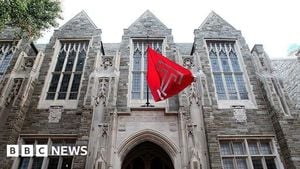Two months have slipped by since the dazzling lights of the Paris Olympic Games dimmed and the cheers of the crowds faded, but the aftermath for the French capital is far from the euphoria it once promised. The thrill of hosting the world's greatest athletes now gives way to somber reflections of what lies ahead. Indeed, Paris finds itself grappling with not just the emotional post-Olympic blues but also mounting challenges as the budget for sports shrinks dramatically.
Swimmer Florent Manaudou, who earned two bronze medals at the Games, captures this mood perfectly. "It’s been very complicated emotionally since the end of the Games,” he expressed, adding, “I want to move forward. I don’t want to be stuck in August 2024 for months and months.” After having had the honor of being the first to carry the Olympic flame on French soil earlier this year, arriving at Marseille amid sparkling expectations, his sentiments now echo the mixed fortunes of the city itself. The festive atmosphere has waned, replaced by steeper demands on civic resources as the excitement gives way to maintenance and repairs of the temporary Olympic venues winding down.
With the festivities of the Olympics now relegated to memory, rising costs are taking the center stage. Reports indicate the French government has signaled the need for budget cuts, leading many to express concern about the future of sports funding. Notably, even the glimmering Eiffel Tower, once adorned with the Olympic rings, now stands bare, emblematic of the capital's retreat from its glittering moment on the world stage. Paris had bet big on the Olympics as both sport and spectacle, but as the lights go out, the hope of economic revitalization hangs heavily.
Meanwhile, it's not just the athletes who are feeling the aftershocks of the Games. International shooting sensation Kim Ye-ji, who shot to stardom during the event with her cool demeanor and impressive performance, announced she would be taking time off from competitive shooting. At 32, having recently earned silver in the women’s 10m air pistol category, Kim became the subject of Internet fascination after her calm video went viral. The pressure to perform and maintain public interest took its toll, with her agency citing exhaustion from the intense media scrutiny and competition as the main reasons for her decision.
“I want to make up for the time I couldn’t spend with my family,” she stated, signaling her intent to temporarily step away from the sport to spend quality time with her young daughter. This choice is not retirement but rather a necessary reprieve as she navigates the balance between her professional life and family commitments. Even Elon Musk had taken notice of her rise, humorously advocating for her casting in action films, dubbing her so iconic on social media. Kim’s self-care move resonates with many athletes returning to their everyday lives after such high-stakes competitions.
Reflecting on the repercussions of the Games, many athletes are now caught between trepidation and hope. The emotional strain of re-adjusting to life without the Olympic thrill can be as demanding as the competition itself. While some like Manaudou and Kim are seeking new paths, others are grappling with expectations and disappointments as they project themselves forward.
Of course, the narratives of the Olympics run much wider, involving not just those who participated but all involved—from organizers to the residents of Paris, who at times bore the hefty weight of logistical challenges. Public sentiment amid budget cuts weighs heavily, with debates erupting over how to prioritize sports funding and address wider civic needs. A booming tourism industry was expected to follow, but with the massive expenses and undercurrents of dissatisfaction, the optimism is becoming wary.
The high spirits once fueled by the Olympics have dimmed, yet there remains hope for rejuvenation. Paris, with its storied history and cultural brilliance, is no stranger to adversity. It is important to recognize the monumental task of rebuilding not merely the sports infrastructure, but the psyche of its citizens and athletes alike.
Meanwhile, as athletes like Manaudou and Kim take steps back, one can hope they will find new ways to thrive and engage with their passions, altering not just personal trajectories but eventually influencing the sports culture at large.



